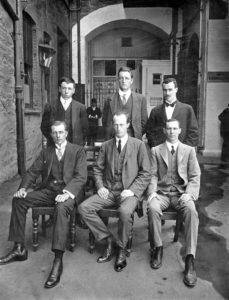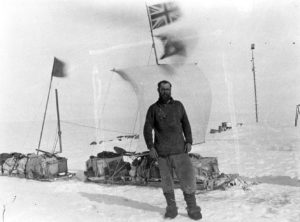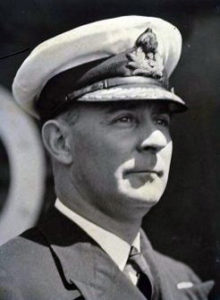By Martin Linsley
Morton Moyes was a man to admire. ‘He was a true leader – a simple man – a modest man – in very truth a gentle man.’ and yet he lived an extraordinary life, most famously for his role in Douglas Mawson’s Australian Antarctic Expedition in 1912-13. A man who appreciated the value of learning, teamwork and adventure, Morton Moyes was also an exceptional Naval officer.
Moyes was born in Koolunga, South Australia to headmaster John, and Ellen Jane Moyes in 1886. One brother, John, became an Anglican bishop, and the other, Alban, became a first-class cricketer, journalist, and cricket commentator. Morton was educated in Adelaide and graduated with a Bachelor of Science in physics and mathematics in 1910, having represented South Australia in athletics. A love of sport was a feature of his life, as was ‘a deep and abiding feeling for his fellow man’. Moyes became affectionately known to many of his fellow Naval officers as ‘Daddy’[i].
Whilst at university, Moyes’s geology lecturer, Douglas Mawson, became a major influence in his life. Shortly after graduating, aged 25, and while teaching at Rockhampton grammar school, Moyes successfully applied to join Mawson’s Australasian Antarctic expedition. He was to be the meteorologist for Frank Wild‘s western base party which was to winter on the Shackleton Ice Shelf. In preparation, he received a few days of instruction in meteorology in Hobart in November 1911.[ii]

The diary that Moyes kept between December 1911 and February 1913 provides a fascinating insight into his experiences in Antarctica: the environments suffered, the challenges met, the daily lives that Wild’s group experienced, and the character of Morton himself. Some selected extracts:
whilst on the SS Aurora heading south;
December 1911
… Passed pleasant day on Aft. Hatch in rain & spray sick in company. Convalesced 2 days helped on by bad food & rough weather, & delightful boil on the neck.
… Had a day’s cooking. Learned to make bread & good scones
… Cheerful crowd always gather near engine room, gossiping, lying & bombasting
… Boxing contests knocked out Dr Whetter 2 rounds
2 Jan 1912. … Killed & dressed 4 sheep in 12-4 watch.
7 Jan 1912 … Learned Morse Code, as will have to take wireless messages. Wild going to (hold) Sunday Services. Snow balling the order. Officers got it hot.
26 Jan 1912 … Ship rolling at least thro’ angle of 70° Meals a state of hurry & grab plus dodge the cocoa.
whilst on the Antarctic ice:
3 March 1912. … Put up the Meteorological Screen. Had a grand little Service at 12 am. Hoadley on Harp. Had prayers, Venite, last psalm. ‘Now thank we all our God’ & ‘Eternal Father’. Very nice & liked by all.
5 March. … Wind very strong all night & this morning doorway had 6 ft of snow. Could see nothing further than 10 yds.
15 March. … Came to huge (crevasse) at 3.30. Had honour of walking over tied to 60’ Alpine rope just long enough, & only went thro’ at further edge.
21 March. … 8 frost bitten fingers through handling cold metal at 40 below freezing point.
24 March. … Never want another experience like the last 26 hrs, practically foodless, sleepless cramped & (immobilised) under heavy snow for 8 hrs. Glad to be back for Easter Sunday.
23 April 1912. … Fine day. Very low temp, but no wind at all. Jones Harrison & self helped Kennedy build Igloo for Magnetic work. Took Thermograph to pieces & found Mainspring oiled, probably causing stoppage when oil froze. Found Games Box & got Soccer Football, & had an hour’s kicking. Too fat to run & no wind at all. Read Paracelsus & Believer’s thoughts.
8 May. Slept 8-11. … Then wrestling bout with Watson Jones & Dovers. Since then read History, wrote up Met. Log & read Bible, as am on Night Watch. Wind raging outside.
22 July. … We have now seen a live Petrel, a ½ dead seal & a dead penguin in 5 months. Hope we strike more before Sledging time.
3 August. … Won the 4 cigarettes for losing most weight for the weight going down 2 lbs.
8 August. … Went down to -42 at 6 am = 74 degrees below freezing pt. … Gave up 1st Sledging trip in favour of Watson altho’ Wild said I could go. Means no move for me till Oct 1.
22 Aug. … Up at 5.30 am. & left at 7. Mild day & did 11 miles 600 yds. All somewhat fleshy & dogs not used to the travelling. Had one man with them & 5 pulling about 200 lbs per man.
3 September. … An awful night (in tent). Cuddled & shivered in a little bunch all night, temp down to -40 ° F. … Both tents blown down with heavy wind & took all hands on each to get them up again. Just inside when a huge avalanche scared a year’s growth out of us. Our door jammed, but with united efforts increased by fear we pushed up the tent & crawled out.
7 September. … Timorous mortals should not venture on these expeditions, only men of steel throughout. Had a game of Whisky Poker & keen discussion on International Politics. Also, a little Geology. Breakfast & tea fell to my lot.
21 September. … Had a bath (1st for 5½ weeks) & changed clothes for 1st time 5½ weeks also.
19 November. … Had some shooting practice. Hot with Winchester but very so-so with revolver.
7 November 1912. … Jones got breakfast for me then packed sledge & away at 10.30. All alone here now & the silence is immense

6 January 1913. … Feel like a 2-year old tonight after my 10 weeks loneliness. Gave them a jolly fine feed all day.
21 January. … Then heard shouting from the Glacier to South & made out a dark spot which soon appeared as the Western Party. Rushed along & helped them in. Yarns the rest of the evening.
31 January. … The Aurora should have been in to-day, & great yarns about the mail being overdue. Literature is absolutely at zero, if one man mentions a name all the others can fill in the story in detail, even to sentences.
23 February. … All sitting about reading except Wild & Jones who went for walk to the floe. Jones rushed in about 10.15 to say Aurora in sight. We all put on our harness, loaded sledges & had 3 good loads at floe edge when ship came in. Bad news awaited. Mawson’s party overdue & he struggled in late, Mertz & Ninnes being dead.
The diary records that on 7 November 1912 Moyes was left alone in the party’s hut while a group, led by Wild, went on a sledging trip. The loss of a sled delayed the group’s return so that Moyes endured nine weeks of anxious solitude.
The influence that Antarctica had on Moyes, and his eloquence in written English are evident in his writing. ‘The solitude went with me like an unseen presence, an utterly silent, friendless watcher’ … ‘That country built frost on a man, plated him with ice, stiffened his garments like armour. It found him out in character and physical endurance’ … and ‘I don’t know what drove me on. But a man is never beaten, I think, until he beats himself’[iii].
In 1974 Morton Moyes was recorded giving a talk titled With Mawson to Antarctica in which he recounted his Antarctic experiences. The Navy Historical Society of Australia’s 68-minute podcast of this recording[iv] can be heard via the website research page is marred by the sound quality as it progresses, but is worth listening to.
Shortly after returning to Australia in March 1913 Moyes was appointed headmaster of University Coaching College in Sydney. He wasn’t there for long, because Captain William Creswell, RAN (later Vice Admiral Sir William Creswell, KCMG, KBE) recruited Moyes as a naval instructor, initially of mathematics, but later of navigation, for the new Royal Australian Naval College. [v]
In January 1916 Moyes was promoted senior naval instructor, and a few months later he was seconded as navigating officer of the Aurora for Captain John King Davis‘s rescue mission for members of Ernest Shackleton‘s Imperial Trans-Antarctic Expedition. On return, he resumed work at the Naval College, where he served until a posting in 1919 took him aboard the old cruiser HMAS Encounter, the seagoing training ship for the Fleet. At that time the ship took onboard many boys who had completed their training in the Training Ship HMAS Tingira and were now getting their first real taste of life at sea.
During WW I Moyes twice attempted to leave the naval college to enlist in the Australian Imperial Force, but was refused as his duties were considered of national importance. In October 1918, when his resignation was finally accepted, the war was all but over. He married Miriam Esther King in Sydney on 11 January 1919 and re-joined the Navy as an instructor lieutenant. For nearly a decade his postings alternated between time at sea in cruisers instructing junior officers and sailors, and shore service at HMAS Penguin and Flinders Naval Depot (later HMAS Cerberus) where he supervised schoolmaster and instructor officers; he was promoted instructor lieutenant commander in 1920 and commander in 1924.
In September 1929 Mawson requested Moyes for the British Australian and New Zealand Antarctic Research Expedition which was to assert British territorial claims in Antarctica by means of two voyages in the research ship, Discovery. Moyes wanted to serve as a ship’s officer, but the vessel’s captain, John King Davis (who had also been Aurora’s captain), felt he lacked the required skills and he became survey officer. Moyes did not undertake the second expedition in November 1930, returning to the Navy instead.

Moyes was fleet instructor officer aboard HMAS Australia for six years before becoming the Navy’s first instructor captain in June 1941. In November 1943 he was posted as the first director of educational and vocational training at Navy College, Melbourne, where he established correspondence courses for those at sea and began a psychology section for vocational guidance.
Morton Moyes left the Navy in 1946 and became chief rehabilitation officer for the Commonwealth, where he was responsible for the post-war training of some 11,000 ex-servicemen and women. Following his retirement in 1954 Moyes served as president of the Naval Association of Australia. He served as president of the Geographical Society of New South Wales from 1933 to 1935. He contributed substantially to an Australasian Antarctic Expedition meteorology volume; and the British, Australian and New Zealand Antarctic Expeditions report, Soundings. Moyes also published several reminiscences of his Antarctic experiences.
In recognition of his Antarctic expeditions Moyes was awarded Polar medals in silver and bronze and a bronze clasp, was awarded an OBE in 1935, and made a fellow of the Royal Geographical Society.
Moyes was sturdily built, erect in bearing and with a direct gaze; his sanguine temperament and strong religious faith stood him in good stead during his Antarctic expeditions[vi]. A widower without children, he died in Sydney on 20 September 1981 and is commemorated by several Antarctic place-names.
References.
D Fairfax. Australian Dictionary of Biography, Volume 10, 1986, online in 2010
Morton Henry Moyes diary, 2 December 1911-23 February 1913, Mitchell Library, State Library of New South Wales
AS Storey, DSC, CMDR, RAN, Rtd. Obituary for Captain Morton Henry Moyes, OBE, RAN
Wikipedia entry for Morton Moyes
[i] Commander AS Storey, DSC, RAN; Rtd. Obituary: Captain Morton Henry Moyes, OBE, RAN
[ii] Denis Fairfax, Australian Dictionary of Biography, Volume 10 , 1986
[iii] Commander AS Storey, DSC, RAN, Rtd. Obituary: Captain Morton Henry Moyes, OBE, RAN
[iv] Captain Moyes was with Mawson in the Antarctic in 1913: NHSA Podcast
[v] Wikipedia entry for Morton Moyes
[vi] Wikipedia entry for Morton Moyes




